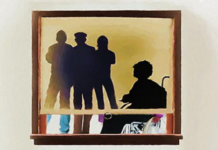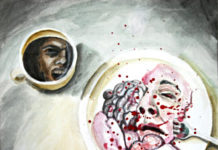Dual-award Winning Play and Film About Human Beings, not Psychopathology
[M]y play, SHADES, and my film, "Is Anybody Listening?" are about people who have experienced major troubles, even trauma or other tragedies, who have dark secrets that torment them, but who use connection, love, humor, and creativity to come through, even to heal. And no one in the play or the film is pathologized.
Inner Fire: Healing and Recovery Without Meds
For five years, I and others worked to create a residential healing community in Brookline, Vermont, where people could recover from debilitating and traumatic life experiences, which often lead to addiction and mental health challenges, without the use of psychotropic medications. We welcomed our first six seekers to a yearlong, therapeutic and farm-based, day program last September, and we now can report on what we have learned during this time.
“Constructing the Modern Mind”
Psychiatrist and historian George Makari tries to illuminate the historical evolution of our understanding of the conscious mind and how it relates to the...
“Why So Many Smart People Aren’t Happy”
The Atlantic interviews Raj Raghunathan about his new book, If You’re So Smart, Why Aren’t You Happy? “If you were to go back to the...
“Group Drumming Bangs Away at Anxiety and Depression”
“Prozac? Actually, percussion.” Researchers in the UK found that a ten-week drumming intervention significantly improved anxiety and depression for people seeking mental health treatment....
“’Yalom’s Cure’ is a Meditative Immersion into Leading a Psychologist’s Life”
The LA Times reviews a new film about Irvin David Yalom, existential psychologist, emeritus professor of psychiatry at Stanford Unversity. "’Yalom's Cure’ dispenses an...
“Life, Animated: A Remarkable Story of How a Family Reached Their Autistic Son Through...
A new documentary “Life, Animated,” which premiered at the Sundance Film Festival, tells the story of a man with autism who learned to interact...
Mental Well-Being and Engagement in the Arts
Public health researchers at the University of Western Australia examined the relationship between recreational arts engagement and mental well-being in the general population. The results, which have implications for policy makers as well as health practitioners, indicate that those who engage with the arts for two or more hours per week have significantly better mental well-being.
Large German Anti-Stigma Campaign Shows Little Effect on Attitudes
“Overall, this study showed that the information and awareness campaign had almost no significant effects on the general public's attitudes toward people affected by either schizophrenia or depression,” the researchers, led by German medical sociologist Anna Makowski, wrote. “One could assume that deeply rooted convictions cannot be modified by rather time-limited and general activities targeted at the public.”
Storytelling Therapy for Trauma and Bullying
A study out of the University of Buffalo explores the use of Narrative Exposure Therapy to treat youth PTSD and substance abuse. “Trauma is...
“Veterans Let Slip the Masks of War: Can This Art Therapy Ease PTSD?”
“Service members suffering from PTSD often feel like they’re wearing a mask,” Samantha Allen writes in Invisible Wounds. Melissa Walker, an art therapist, asks them to make one. “The results are stirring. One mask, striped in red and black with hollow chrome-colored eyes, is wrapped in razor wire with a lock where its mouth should be.”
“Therapy Wars: The Revenge of Freud”
Writing in The Guardian, Oliver Burkeman discusses the comeback of Freud’s psychoanalysis, along with humanistic therapy, interpersonal therapy, transpersonal therapy, and transactional analysis and...
“Medication and Female Moods”
Listen: NPR’s On Point with Tom Ashbrook discusses the new book “Moody Bitches: The Truth About the Drugs You’re Taking, The Sleep You’re Missing, the Sex You’re Not Having and What’s Really Making You Crazy,” by the psychiatrist Julie Holland.
Saved by the Book: Can Reading be More Effective than Medication or Therapy?
“Studies show that self-help books can resolve readers’ depressed moods, change ingrained thought patterns, and instill a renewed zest for life – as long as the advice within is scientifically sound,” Elizabeth Svoboda writes for Aeon. “The literature we choose to guide us should supply proven advice we can trust. But it should also, as Franz Kafka wrote, be ‘the axe for the frozen sea within us’, bludgeoning us in ways that awaken us to the extraordinary.”
A Mental Patient’s View of the Body
In 20 years of inpatient hospitalization, the psychiatrists that I encountered focused almost exclusively on treating my diseased mind and had no concept or interest in the body. While the wheels of “progress” turn slowly in mental health, I hope that along with ongoing advocacy there will be a focus on responsible health counseling and supporting people in healthier eating and living.
“Mindfulness at Risk of Being ‘Turned into a Free Market Commodity’”
The Guardian reports growing concerns from the Buddhist Society conference: “Jon Kabat-Zinn, who created the Center for Mindfulness in Medicine at the University of Massachusetts medical school, warned last week that some people feared a ‘sort of superficial ‘McMindfulness’ is taking over, which ignores the ethical foundations of the meditative practices and traditions from which mindfulness has emerged, and divorces it from its profoundly transformative potential.’”
Vail Place Focuses on Collective Work for Mental Health
Minn Post did a feature story last week on Vail Place, an alternative mental health treatment center run on a community “clubhouse” model where the nearly 900 members and staff work side by side to run the center’s activities. Vail Place was founded in Hopkins, Minnesota in the early eighties by mental health activists and family members as a community for psychosocial rehabilitation. “The work isn’t therapy,” a member explains. “It’s growth. It’s ‘I cans’ rather than ‘I can'ts.’ And that’s important for mental health and survival.”
Mad Economy: Let’s Change the World!
Everyone in the world is either touched by their own mental health issues or have had a family member affected. What if they directed their buying power to an organization that would use the profits to fund exciting mental health & recovery projects both in the developing world and in their own countries; projects that would be ethical, non-coercive, personal recovery-based, and were aimed at creating recovery communities? What if they could buy products, crafts, services, art, music, books from people who had experienced mental health issues, enabling them to set up their own businesses or buy from social co-operatives that enabled distressed people to work and earn a living wage?
“Can Madness Save the World?”
Writing for CounterPunch, Paris Williams writes that when an individual is experiencing what has been termed “psychosis,” it is important to recognize that this may also be the manifestation of a breakdown in their larger social groups, the family, society, and even the species.
Series on Anti-Psychiatry and Critical Theory for World Mental Health Day
To coincide with World Mental Health Day on October 10th, 2015, Verso Books, the largest independent and radical publishing house released a series of blogs on mental health and critical and antipsychiatry. The posts include pieces on R.D. Laing, colonialism, women’s oppression, delusions and art, “The Happiness Industry,” and social and institutional oppression.
Using Psychodrama to Teach Psychotherapy
-Sharon Packer describes the therapeutic impacts of getting a patient to play multiple roles, presenting evidence to prove and disprove beliefs about himself and his experiences.
Re-telling Our Stories: Liberation or Re-oppression?
-When we "re-narrate" our own stories and identities, it may be an opportunity for either liberation or re-oppression.
“Making Theater Autism-Friendly”
-The Atlantic reports on the growth of "autism-friendly" movie theaters, sports arenas and now live theaters.
What Role Can Video Games Play in Psychiatric Treatment?
-Psychiatry Advisor reviews the scientific evidence about using video games and virtual reality tools in psychiatric treatment.











